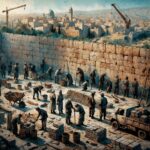The book of Ezra provides a detailed account of the Israelites’ return from exile in Babylon to Jerusalem and the rebuilding of the temple. It emphasizes themes such as the genealogy of the returning exiles, the reign of King Cyrus and King Artaxerxes, the religious reforms led by Ezra and Nehemiah, and the preparations for the rebuilding of the temple. Through the narratives of faith, perseverance, and obedience to God’s law, the book of Ezra underscores the importance of returning to the worship of the one true God and restoring the community’s faith and identity. It serves as a testament to God’s faithfulness and the fulfillment of His promises to His people despite challenges and opposition along the way.
Book of Ezra
The book of Ezra focuses on the genealogical records and the restoration of the Davidic line after the exile to Babylon.

Chapters in Book of Ezra
Summary of the Book of Ezra
F.A.Q. for the Book of Ezra
What was the significance of King Cyrus' decree in the book of Ezra?
King Cyrus’ decree, as recorded in the book of Ezra (Ezra 1:1-4), holds significant historical and theological importance. It marked the end of the Babylonian exile for the Jewish people and signaled the beginning of their return to Jerusalem to rebuild the Temple. The decree fulfills the prophecy of Jeremiah (Jeremiah 29:10), reinforcing the theme of God’s faithfulness in restoring His people. Cyrus’ proclamation also underscores the sovereignty of God over earthly kings, demonstrating that even foreign rulers can be instruments of His divine plan.
Why did the rebuilding of the Temple face opposition in the book of Ezra?
The rebuilding of the Temple encountered opposition primarily from neighboring peoples, as described in Ezra 4:1-5. These adversaries, including the Samaritans, were opposed for various reasons:
- Political motives: They were concerned about the potential resurgence of Judah’s political power, which could threaten their own influence in the region.
- Religious differences: The returning exiles were determined to reestablish the worship of Yahweh according to their traditions, which conflicted with the syncretistic practices of their neighbors.
- Jealousy and resentment: The returning Israelites’ focus on rebuilding their Temple might have incited feelings of jealousy and resentment among those who had settled in the land during the exile.
This opposition led to delays and discouraged the builders, making it a significant challenge that required perseverance and divine support to overcome.
What role did Ezra play in the restoration of the Jewish community in Jerusalem?
Ezra played a crucial role in the restoration of the Jewish community in Jerusalem, as depicted in the second half of the book of Ezra (Ezra 7-10). As a scribe and priest, Ezra was well-versed in the Law of Moses, and he was appointed by King Artaxerxes of Persia to lead a group of exiles back to Jerusalem. Ezra’s primary contributions include:
- Teaching the Law: Ezra’s dedication to teaching the Law of God was central to re-establishing the religious and moral foundation of the community. He led public readings and explanations of the Scriptures, helping the people to understand and commit to following God’s commandments.
- Reforming practices: Ezra identified and addressed issues that were contrary to the Law, such as intermarriage with foreign women. He called for repentance and led efforts to purify the community and align their practices with their covenantal obligations.
- Leading with integrity: Ezra’s leadership was marked by humility, prayerfulness, and a deep commitment to God’s will, which set an example for the community and fostered a spirit of renewal and dedication.
Through his efforts, Ezra significantly contributed to the spiritual and communal rebuilding of the Jewish people in their ancestral homeland.